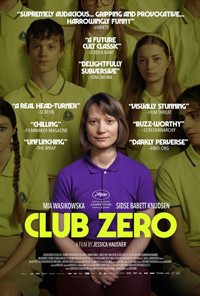The Prime of Miss Jean Foodie: Hausner Satirizes Cult Behavior Through Caloric Deficit

Expanding on the genre sentiments which guided her past titles Hotel (2004) and Little Joe (2018), Austrian director Jessica Hausner‘s latest playfully examines how a toxic mixture of elitism and passive progressiveness can provide a slippery slope to absurdity in Club Zero. The arrival of a new teacher at a prestigious private high school thanks to her reputation as a nutritionist guru for her theories on ‘conscious eating’ eventually reveals she has a more perverse agenda utilizing this faddy mindfulness technique. With school staff and parents basically easy targets just waiting to be swept away from their bored lives filled with recitations on conservation and consumerism as a means to remain oblivious to their own contributions in capitalist conformity, Hausner’s latest is delightfully subversive at its core. At the same time it is neither as exacting nor outrageous as it should be, which tends to lasso its outwardly comedic elements into a flatline rather than dig into the devious underbelly of human nature.
Ms. Novak (Mia Wasikowska) has just been offered a teaching position at an elite private school, warmly greeted by her new boss, Ms. Dorset (Sidse Babett Knudsen). A dozen or so students have volunteered to be part of her extracurricular course in Conscious Eating, a technique meant to cut back on the consumption of food and, ultimately, benefit the environment. Most of the students are either suffering from secret but already well established eating disorders, while others are looking to fill the emotional void left by neglectful, absent parents. While a lone scholarship student initially rebels, participating only to satisfy a requirement to obtain the money he needs for his education, many of them become obsessively meticulous in following Ms. Novak’s instruction. This begins to worry the parents as they delve deeper into Conscious Eating, moving away from mindfulness into mono diets, and eventually fasting to generate autophagy. But her more zealous students believe they can be even more committed, and Ms. Novak reveals there’s a secret organization called Club Zero, wherein participants live without eating at all, professing to be a member herself. Some of the students want to be a part of the club, believing in the faith their teacher preaches.
If Ruben Östlund had directed Ulrich Seidl’s Paradise: Hope (2013), a thematic trilogy cap concerning an overweight thirteen-year-old at a summer diet camp her parents abandon her unto for their missionary work, it likely would have shared a similar tone to Club Zero. But Hausner and co-writer Geraldine Bajard eventually drive the film into a steady tread of which only the predictably inevitable transpires, resulting in a fatal but familiar exercise in human folly. Without any real sense of dread and with muted displays of outlandish enterprise (a girl vomiting for her parents in her bedroom while calmly ingesting it again as if her vomit were gourmet cuisine is the sole moment of utter perversity), Club Zero begins to feel as lusterless as the sterile school and its muted color schemes, the students dressed in clashing uniforms with matching cafeteria ware the tone of banana laffy taffy.
As the psychotic Ms. Novak, Mia Wasikowska speaks in calmly administered clips, hiding an indistinguishable accent. Her behavior is more akin to a quietly deranged Mary Poppins, though one questions if there is some sort of master plan at work for her to recruit wealthy children like an anorexic pied piper. Though she’s entertaining, Wasikowska, like the film’s narrative, hovers in a one-note realm, her manipulation of the children, all with significant emotional and behavioral issues their parents are ignoring anyway, as methodically assured as the passage of time. This leaves the mostly ambivalent and oblivious parents to pick up the comedic slack, including Elsa Zylberstein as a mother with her own obvious eating disorder, and Mathieu Demy as an aggressively opinionated but detached father. Amanda Lawrence (who’s amusing in her limited capacity, like the grandmother played by Mai Zetterling in Roeg’s version of The Witches, 1990), mother of the ‘scholarship kid,’ is, of course, the only voice of reason. Sidse Babbett Knudsen as the bemused school headmistress is also a vibrant highlight, more concerned about what the impact of Ms. Novak’s absence will have on her skeleton crew for weekend school staff.
Hausner’s most discerning elements in Club Zero utilize a seemingly nonsensical and illogical method to highlight how easily complacency and ennui can allow for the orchestration of mass brainwashing, where facts are quietly cast aside to satisfy either the cult of personality or feed secret yearning or desires otherwise politely curbed in civilized circles. Essentially a metaphor for fanatical religious cults, as well as paralleling the resurgence of nationalist/fascist/tyrannical societal sentiments across the globe, Club Zero may be utilizing sarcasm in speaking truth to power, but it could bite a lot harder than it does.
Reviewed on May 22nd at the 2023 Cannes Film Festival – Competition. 110 Mins.
★★½/☆☆☆☆☆


